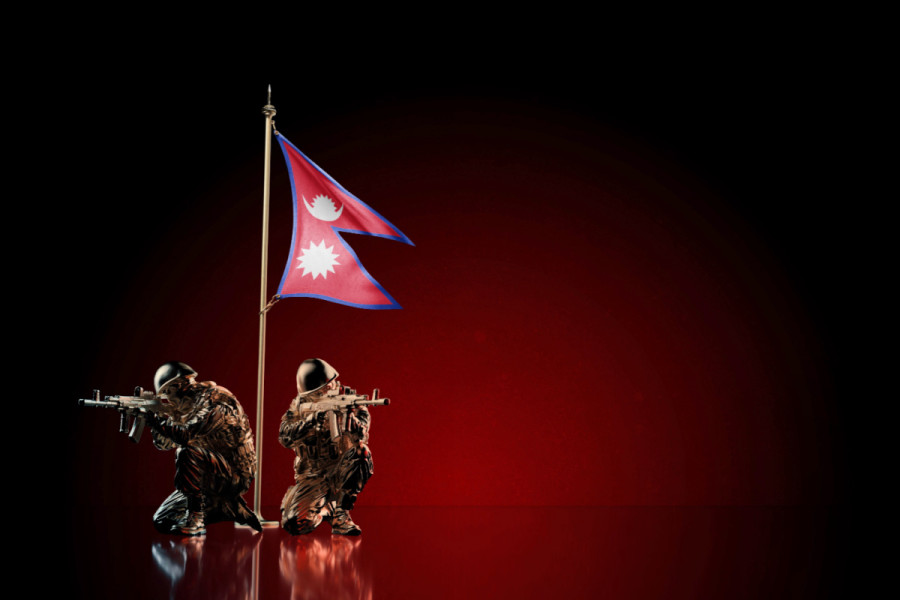Columns
Global arms control and Nepal
Given our hopeless situation in arms manufacturing, our best bet is on their control.
Hitesh Kumar Bhattarai
As the race to manufacture weapons continues on the global stage, Nepal’s capability to produce them remains minimal. With less than 10 countries producing nuclear weapons, the possibility of Nepal producing the same, with its limited financial and technical resources, is non-existent in the foreseeable future. In fact, the country does not produce sarin or mustard gas on a mass scale. Even the simple rifles and assault weapons used during the Maoist insurgency were imported. To produce biological weapons, the country would need enormous help from foreign countries, and this makes little sense.
But do we really need to produce weapons even if we could? The answer is: No. Our adjacent neighbours, India and China, are nuclear nations with vastly superior manufacturing and can produce weapons. In a conflict, we would never be able to compete with them. Unless we can develop a nuclear capability which serves as a deterrent, all other capabilities could be meaningless. So, our best bet is on global arms control. Nepal has consistently advocated for global peace and non-alignment. The history of commitment to non-alignment dates back to 1975 when King Birendra proposed Nepal as the Zone of Peace. Although the proposal has lost its essence today, it was a strategic move to protect Nepal from invasion or interference by neighbouring countries.
The arms race
While the arms race occurred during and after the Cold War, conventions to control arms have advanced with time. The Cold War adversaries—the United States, the Soviet Union and the United Kingdom—negotiated a Biological Weapons Convention at the height of the war. The convention, which prohibits the stockpiling, transfer and use of all biological weapons, including pathogens and toxins, has been signed by 185 states so far. However, its implementation has remained challenging due to a lack of compliance regime. After the fall of the Soviet Union, it was revealed that despite signing the convention, the Soviet Union had an active biological weapons development programme during the Cold War.
Similarly, the Chemical Weapons Convention, the Nuclear Non-Proliferation Treaty, and the Comprehensive Test Ban Treaty are essential in dealing with weapons of mass destruction. The Chemical Weapons Convention, signed in the 1990s, has a much bigger verification regime whereby non-compliance by the state parties can be monitored. Chemical weapons, including sarin and mustard gas, were extensively used in wars and claimed over a million lives. The treaty’s ratification with a verification regime can be hailed as a massive success towards global peace.
The other two treaties can be more important as they help limit the powerful nuclear bombs. They were used twice in Japan, with devastating consequences regarding the loss of human life and property. Many countries do not possess nuclear weapons, but the US and Russia do. However, their number has significantly decreased with the end of the Cold War, and most nuclear warhead reduction treaties involve these two countries. Constant global discussion and negotiation exist regarding controlling other ammunitions such as missiles, landmines and cluster weapons.
Nepal’s approach
Amidst all these negotiations and conventions, Nepal’s role in arms control has been minimal. During the Cold War, the global south was generally regarded as irrelevant and discarded from these negotiations. The underdeveloped countries either supported one of the two alliances or remained neutral. After World War II, the global economy became increasingly interdependent, and conflict between trading state parties was detrimental to the concerned parties. Because of this and the end of the Cold War, the arms race had somewhat slowed. War has been raging in Ukraine, breaking this general rule and negatively affecting the peaceful global order.
Nepal’s benefits from arms control and reduced belligerence by large states make it pertinent to participate in arms control. However, the awareness of these global arms control regimes among Nepal’s diplomats and experts is poor. The same is true internationally, as one needs to be fluent in diplomacy, international relations and science to understand these conventions.
A positive trend of involving the global south in disarmament and arms control has started. The Biological Weapons Convention implementation unit recruits youths from the global South and conducts workshops and seminars every year. From August 28-30, 2023, a sub-regional workshop on enhancing the implementation of biological weapons convention in South Asia took place in Kathmandu. Thirty experts from Nepal, Maldives, Sri Lanka, the World Health Organization and the Food and Agriculture Organisation attended it. Such programmes help promote the participation of Nepal in biosecurity and arms control.
Since Nepal may not be able to compete in the arms race, it should participate in the advocacy and diplomacy of arms control. Training scientists and deploying diplomats internationally for peace and arms control advocacy is essential to achieve this. Providing underrepresented youths and women opportunities to participate in these efforts is also vital. The voices of youths should be heard as they constitute a significant demographic currently in the global south.




 8.26°C Kathmandu
8.26°C Kathmandu















